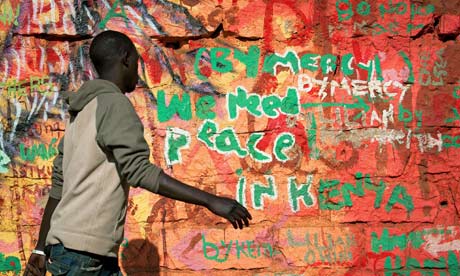Kenya's new imperialists
On Monday Kenyans elect a new generation of leaders, forged not by the independence struggle but western corporate greed

When Kenya goes to the polls on Monday, it will mark a generational change – no matter who wins. For the first time in its history, the country will be run by a leadership with hardly any direct experience of colonialism. There are risks to this development: the new leadership might trivialise what it means to be colonised, and the insidious ways in which imperialism is reproduced.
The outgoing president, Mwai Kĩibaki, is the last of the generation that led the country to independence, and for whom, whatever the policy, imperialism and anti-colonial resistance were not just slogans. They had seen blood in the streets and mass incarceration; the Hola massacre was mere smoke at the gates of hell. The first lady, Lucy Kĩbaki, was brutally tortured.
For them, Churchill – who presided over the concentration camps and villages and brutal mass relocations of people – can never be a hero. And whatever their shortcomings, they still have memories of the heroic deeds and sacrifices of ordinary Kenyans of whatever ethnic hue; they know in their bones that it was the unity of the Kenyan people that made independence possible.
The next leaders will not be encumbered by memories of humiliation and triumphant resistance. This may make them act with more confidence relative to Europe and the outside world. But it may also make them gullible to the machinations of the corporate west, without regard to a national vision. Chillingly, Kenya is on the brink ofcommercial oil production, and western firms are lining up for a slice of the cake.
We can get glimpses of the future by looking back to the last parliament. Asked to set up local tribunals to deal with crimes emanating from the horrific 2007/8 electoral violence, the MPs vehemently rejected the idea and shouted: "Don't be vague; let's go to The Hague." When the Hague-based international criminal court responded with summons, the politicians shouted: "Imperialism! We are no longer a colony!"
The rejection of homegrown institutions as vehicles for redress was the main abetter of that violence they refused to address internally. You cannot say the elections are rigged, and then refuse to utilise, even exhaust, the available democratic channels, however flawed they might be. The muscular tension that had built up during the hotly contested elections had no established channels for release. National institutions may not be the best, but they are often the basis of sober evaluations of claims and counter-claims.
Their contempt for national institutions can be seen in other ways.
Throughout the anti-colonial struggle and into the first years of independence, there were well established political parties, with differing visions: institutions with policies and clear guidelines on electing and rejecting leaders. The political class destroyed these. The contending parties in Monday's elections are all paper parties – or less politely they are regional mafia blocks under a boss. The party is the boss and the boss is the party: no history, no institutional memory, nothing to help regulate political behaviour and practice even within the boss party.
Some of the more infamous acts of the last parliament include passing a motion to ban African languages in official premises; a rural peasant would now have to bring an interpreter to a government office to have his needsattended to.
Moreover, more than 200 MPs – already some of the most highly paid in the world – voted themselves aseverance package that included over $80,000, diplomatic passports for themselves and their families, armed protection for life, and state burials for each of them. The president did not sign the bill, but it gives a clue as to the ruling mentality – a mentality that looks at the state as a looters' paradise.
This mentality finds a good partner in the bribing culture of the corporate west. In the US, bribery is official in the system of registered lobbyists. But there are the established institutions of the press and the courts that sometimes help cushion the impact of the fallout from corporate greed. For Kenya and Africa, however, the combination of local and outside raiders is deadly for the country and emerging democracies.
I am cautiously optimistic that there will be peaceful acceptance of the election results. But I fear that the governing class will continue to be no more than mimic men – copying their western counterparts in greed and contempt for the regular folk, while happily shouting "imperialism" when the slogan helps them cover up their looting tracks in the face of an angry populace.
